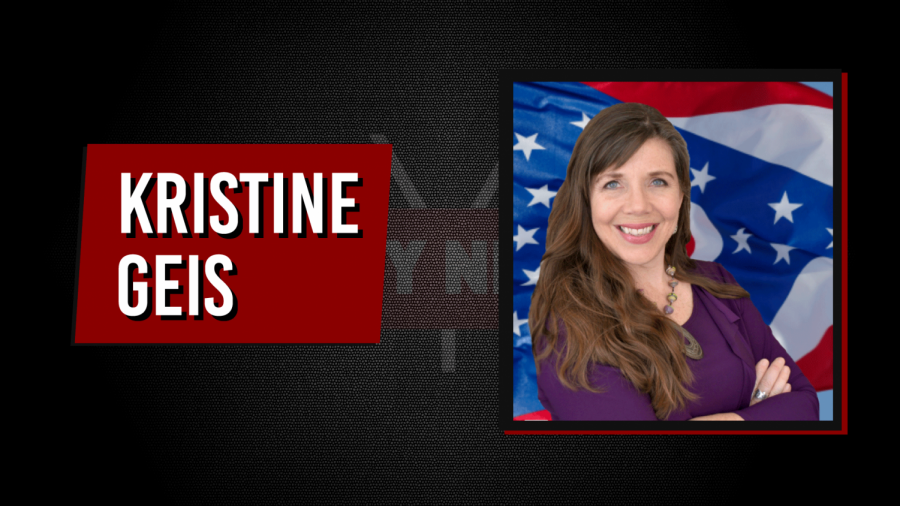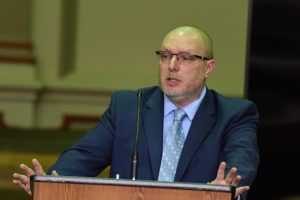Meet the candidate: Geis and the power of purple
November 1, 2018
“I’ve always thought about it, and finally, in the back of my head, I hear my mom going ‘Honey, if you want to get something done, you just need to go do it yourself. You don’t stand on the sidelines waiting for somebody to help you. You go do it,” said Kristine Geis while writing campaign postcards for her run at Ohio’s 97th District State Representative seat.
Geis, a Canton native who’s called Muskingum County home for the past 15 years is just like any other working class mother. She’s raising two girls with her husband, working two teaching jobs and now she wants to align two parties and make some progress in Columbus.
At both the federal and state levels, Geis wants to see more accomplished.
“I am really disappointed with the way our leaders are working right now,” said Geis.
She tried to get her concerns across as a citizen by creating a community group that wrote letters to elected officials but found she wasn’t being heard.
“I realized that they weren’t listening, and I think we deserve leaders who are going to listen to the community and to the people and give them a fair hearing on everything, even if you agree with it or not, not just tell you why you’re wrong,” said Geis.
Throughout the months leading up to the November election, Geis could be spotted at any community event in Muskingum and Guernsey counties.
Whether it was at the New Concord Fireman’s Festival, a Zanesville Think Tank on Poverty Meeting or calling a square dance at Cambridge City Park, Geis was there, clad in her “power purple” campaign t-shirt, socializing with the community.
It was through participating in events such as those and knocking on doors throughout the various neighborhoods in the counties she wishes to represent that Geis gained a better understanding of her own neighbors. She was then able to form her main platform goals based on the issues most important to the constituents of the 97th District.
Living wage jobs
“I found that there is a serious problem with what I’ve been calling predatory employment in Zanesville,” said Geis.
Explaining her concept of “predatory employment,” Geis said there are many large companies in Zanesville that hire employees through temporary agencies on short-term cycles.
“They will either work them under 40 hours so they don’t have to pay benefits and full-time, or they will hire them for 90 days on contract and then fire them and then re-hire them,” said Geis.
Under such circumstances, Geis said employees don’t have access to benefits and living, full-time wages.
“That was astounding to me,” said Geis. “You’re working your butt off and then you’re not getting anywhere. You just go to start over and over again.”
Geis doesn’t blame the companies for their staffing approach, instead she blames the state for legally allowing such operations and wants to change legislation on this issue.
Education
As a teacher, it’s no question that education is a priority for Geis.
“The great thing about being a substitute teacher is I go to different school districts, and I’m in different grades, and I talk to different teachers all the time,” said Geis.
Through those conversations, and her own experiences, Geis has identified several fundamental issues she’d like to see changed.
“It’s so commonplace, it’s almost cliché anymore the amount of time that’s being spent teaching to the test so that they can pass these big, high stakes tests that are required by the state,” said Geis.
Geis is calling for a reevaluation of state testing.
“We need to look at what we’re testing, why we’re testing and see what’s unnecessary,” said Geis.
Geis pointed out that republicans are oftentimes opposed to unnecessary regulations but claimed that’s not the case in education.
“They don’t seem to want to do anything about that in the education spectrum,” said Geis.
Another educational concern for Geis has to do with fair and equitable funding for schools.
It’s an issue Geis has addressed with the Ohio Education Association but was told it is not a priority.
“The current leadership that we have in the State of Ohio legislation … It’s not on their agenda,” said Geis. “They don’t care, and It’s not going to be taken care of.”
Geis explained that the state determined the cost to educate one child is $6,040, but school districts don’t receive that full amount.
“You make between five percent and 85 percent of that amount depending on what the department of education has decided you can afford in your community and the rest has got to be made up by the community,” said Geis. “Already, people don’t know, that levies are absolutely expected from every community.”
Using West Muskingum as an example, Geis said the school district is paid 30 percent for each child and the community pays the rest, but if a child leaves for an alternative school, it’s on the school district to pay for that child’s education.
Furthermore, Geis said that when a student chooses to transfer schools, whether to another district or some form of alternative education, it’s their home school district that pays for that student’s education.
“The West M school district has to pay that school $6,040, although they only receive $2,010 from the state,” said Geis. “So that means $4,030 is coming out of the levies that West Muskingum people passed to go to another school district.”
Her solution to this problem is passing legislation so that only the amount of money the state provides the school district will follow the child to wherever they transfer.
“This has been something that’s been brought up time and time again in legislation, and it keeps on getting killed so nothing happens. I mean, that’s an easy fix. We could do that, but we need to have the political will to want to do that.”
Health care
Rounding out Geis’ list of priorities is health care amidst a statewide opioid crisis.
“When I talk to people, knocking on doors, they are so concerned about healthcare and the cost of health care, especially seniors,” said Geis.
Geis referred to the previously mentioned “predatory employers” that make health care nearly impossible for many in the working class.
Her solution is providing affordable insurance options.
In addition to health care for common ailments, Geis recognizes the need for affordable addiction treatment.
Referring to the period of time when the American economy plummeted several years ago, Geis said many people lost jobs and turned to drugs, but it wasn’t just the individuals who suffered.
“The communities have lost the money to have anti-drug programs and to have more social workers helping out, and so we hit a hard time and didn’t have that strong community resource to help it,” said Geis.
Geis wants to find a way for state and local organizations to work together to provide opioid treatment resources in a way that is affordable and effective.
Power of Purple
With the tagline of “common ground, common sense,” uniting people with similar goals and finding the common ground between not so likeminded groups is Geis’ philosophy.
It’s why she wears the color purple.
“You have blue democrats and red republicans, and when you bring blue and red together, you get purple,” said Geis. “You get something different and amazing and wonderful by working together and bringing people together.”
Speaking from her background as a Peace Corps volunteer abroad, Geis has experience alining diverse groups for a greater cause.
“I’ve worked in Central America, I’ve worked in Africa, and bringing different peoples together always benefits everybody involved,” said Geis.
Using the national issue of abortion rights as an example, Geis explained that even though she is pro-choice, she doesn’t believe that is the solution for everyone.
“I am pro-choice because I have seen how not having control of your own body as a woman overseas makes you basically a slave. I’ve seen how women are treated in some parts of Africa and Central America, and so I am very much pro-choice. But, I don’t personally ever want to have an abortion,” said Geis.
Geis said she can’t make that decision for every woman. Instead, she would rather address the root cause of abortion.
“I think we can find common ground between the anti-choice people and the pro-choice people,” said Geis. “How about we reduce unwanted pregnancies? Let’s work together to reduce the need for abortion instead of arguing about is it moral, is it right, what is it?”
Of course, Geis understands it’s not possible to reason with everyone, especially people who stick to their philosophical stances, but she believes there are people willing to have a conversation and find common ground to make progress.











